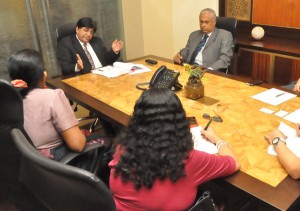WHEN it comes to exporting workers to foreign countries, Sri Lanka looks up to the Philippines as the model.
Minister Dilan Perera of Sri Lanka’s Foreign Employment Promotion and Welfare said that he and Labor Secretary Rosalinda Baldoz will sign a memorandum of agreement for training Sri Lankan workers in the Philippines.
Perera, who is on a three-day visit, said that their workers need to be trained because there is a boom in the hotel industry in his country. A Shangri-La Hotel is being built in the capital Colombo and its employees are being trained in Shangri-La hotels in the Philippines.
Sri Lanka, which has a population of 21 million, has 1.7 million overseas workers who contribute 8.5 percent to the Gross National Product. Most of the workers are in the Middle East, particularly Saudi Arabia.
Perera said his country is bent on improving the skills of its human labor. ”It is in this area where we need the help of the Philippines, since your country has good training modules. Your labor force is well skilled and in fact being looked up as model of all foreign-workers sending countries,” he told The Manila Times.
He added that the Philippines is considered as a training hub of workers.
Perera said his country is exporting more garments, construction workers, engineers, doctors and other professionals to other countries. Perara said his visit is in preparation for the April Abu Dhabi Dialogue, also called “Troika” or a meeting of top labor officials of Abu Dhabi, the Philippines and Kuwait.
He said the three countries formed a group, rotating the chairmanship every two years. This year’s chairman is the Philippines.
“I find it very helpful to hold a meeting with Secretary Baldoz and signing a MOA even before the Troika meeting to iron out agreements wherein our workers could avail of trainings here in the Philippines,” Perera said.
“We want to copy the Philippines in areas such as pre-departure, skills training, recruitment, qualification and even data base,” he added.
Perera said workers should not be treated as commodities but as human beings, and the Philippines is very sensitive in this area with its 10 million migrant workers deployed all over the world.
Sri Lankan overseas workers remit around $1 billion yearly, way below the $26 billion remitted by Filipino workers. The Philippines’ foreign workers remittance is the third in the world, behind India ($71 billion) and China ($60 billion).
Perera said that if there is one thing that the Philippines should imitate from Sri Lanka, it is their practice of preventing a domestic helper from leaving the country if she has a child below five years old.
“We require them to submit a family background report. If we find the woman to be leaving a child of five years old, then we don’t allow them. It is in our culture that a young child should be under the care of his or her mother,” Perera, a lawyer by profession, said.
He added that they also raised the age requirement for domestic workers from 18 to 21. “For those bound for Saudi Arabia, the domestic workers must be 25 years old,” he said.
Perera said the shift from domestic helper to skilled labor is designed to give their citizens a better pay.
Thousands of Sri Lankans work in garment factories in South Korea, Bahrain, Dubai, Cyprus and Italy, while professional workers like doctors and engineers work in Oman.
Perera said the Philippines is considered a model when it comes to skilled workers. He said in California Disneyland alone, more than half of the work force are Filipinos.
Sri Lanka, he said, is not afraid of the so-called “brain drain” because they have a program called “brain gain.”
He explained that after six to eight years of working abroad, Sri Lankans come home and use their skills to put up their own businesses or be absorbed by big companies.
“We have reintegration program for returning overseas workers. We are now working to give them pensions and insurance, among others, which are stipulated in the New Migration Authority Act,” he said.
Accompanying Perera was Nissanka Wijeratne, the secretary of Ministry of Foreign Employment Promotion and Welfare.



